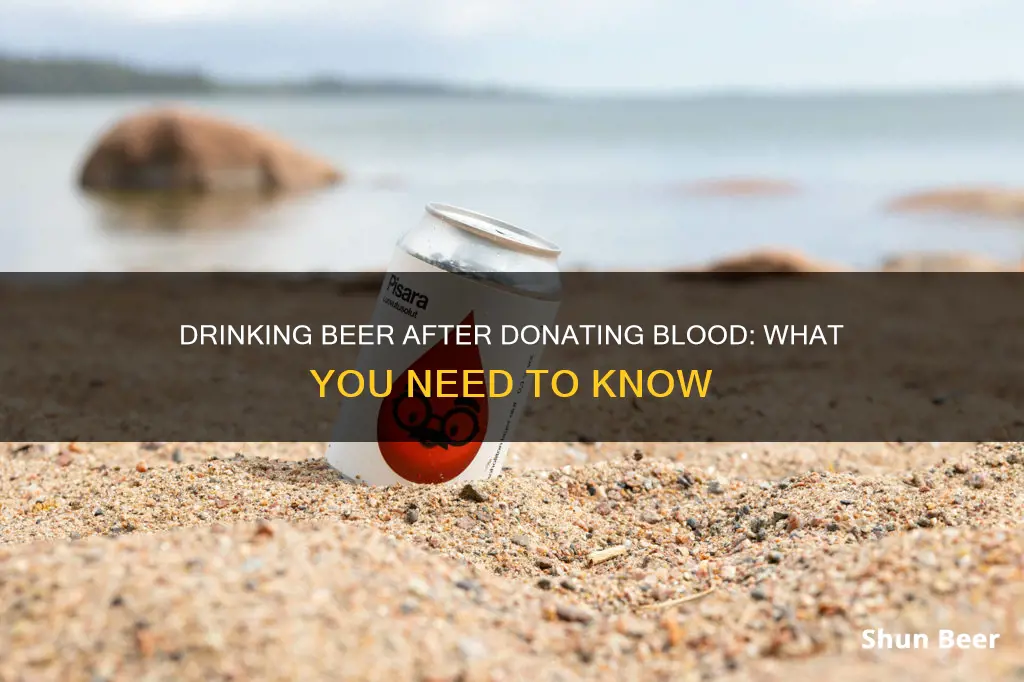
Drinking alcohol after donating blood is generally not recommended, as it can affect hydration levels and delay recovery. Alcohol can also increase the risk of dehydration, which is already elevated after donating blood. However, some people report drinking a small amount of alcohol after donating blood without any issues. It is important to note that the effects of alcohol may be amplified due to the reduced blood volume, and it is crucial to avoid driving or operating heavy machinery. Proper hydration before and after donating blood is essential to prevent dizziness and other side effects.
Can you drink a beer after donating blood?
| Characteristics | Values |
|---|---|
| Alcohol consumption after donating blood | Not recommended; can affect hydration levels and delay recovery |
| Time to wait before consuming alcohol | At least 24 hours, until fully recovered |
| Effects of alcohol after donating blood | Amplified; increased risk of dehydration |
| Safety precautions | Drink less than usual, consume extra water, eat something beforehand, do not drive |
What You'll Learn

Alcohol after donating blood can amplify the effects of alcohol
Alcohol can be very dangerous after donating blood, and it is recommended that you refrain from drinking for at least 24 hours. This is because alcohol's effects are amplified when there is less blood in your system to dilute it. Even a small amount of alcohol can have a more significant impact than you may be used to, and the risk of dehydration is also increased.
It is important to remember that donating blood can lead to some discomfort and side effects for the donor, and consuming alcohol too soon after donating can exacerbate these issues. Side effects may include nausea, dizziness, and pain, and alcohol consumption can intensify these symptoms, making you feel worse.
Additionally, drinking alcohol can interfere with the body's ability to replenish the donated blood. Water is a crucial component of blood, and staying hydrated is essential for the body to recover quickly. Alcohol, on the other hand, can dehydrate the body, slowing down the recovery process and potentially leading to further complications.
To ensure a smooth recovery after donating blood, it is best to focus on rehydrating and replenishing your body's fluids. Drinking plenty of water before and after donating is highly recommended. Eating iron-rich foods, such as spinach and red meat, is also crucial, as your body will use the iron to produce new blood.
In conclusion, while donating blood is a noble act that can save lives, it is important to be mindful of the aftercare. Avoiding alcohol for at least 24 hours is a crucial part of this, as it can amplify alcohol's effects and interfere with the body's recovery process, leading to potential health risks. By taking the right steps and prioritising hydration and nutrition, donors can ensure a swift and comfortable recovery.
Beer Breakdown: Understanding Its Effect on the Human Body
You may want to see also

Drinking beer after donating blood is not recommended
Drinking alcohol after donating blood is generally not advised due to the potential risks and complications it can pose to your health and recovery. Here are several reasons why you should avoid drinking beer or other alcoholic beverages after donating blood:
Impact on Hydration Levels
One of the main reasons to abstain from alcohol after donating blood is to maintain proper hydration levels. Donating blood can result in a significant loss of fluids, and it is crucial to replenish those fluids to aid in recovery. Alcohol, on the other hand, can dehydrate the body, counteracting the efforts to stay hydrated. This dehydration can exacerbate the side effects of blood donation, such as dizziness and nausea.
Heightened Effects of Alcohol
When you donate blood, your body has a reduced blood volume, which means there is less blood to dilute the alcohol in your system. As a result, you will experience the effects of alcohol more quickly and intensely. This heightened sensitivity can lead to unexpected intoxication, impaired judgment, and increased risk of accidents or injuries.
Delayed Recovery
Alcohol consumption can slow down your body's recovery process after donating blood. Drinking alcohol can interfere with your body's ability to restore fluid balance, replenish blood cells, and recover from the loss of nutrients and minerals. It is important to give your body the best opportunity to heal and replenish its resources by avoiding alcohol for at least 24 hours after donating blood.
Increased Risk of Complications
Consuming alcohol after donating blood may also increase the risk of certain complications. For example, drinking can further lower your blood pressure, which is already lowered due to fluid loss during donation. This can lead to feelings of dizziness, lightheadedness, and even fainting. Additionally, alcohol can interfere with blood clotting, which is crucial for wound healing and can increase the risk of bruising or bleeding at the donation site.
Recommendations for Safe Alcohol Consumption
If you choose to consume alcohol after donating blood, it is important to follow certain guidelines to minimise risks. Firstly, ensure that you are well-hydrated before and after drinking. Drink plenty of water or electrolyte-rich beverages to counter the dehydrating effects of alcohol. Secondly, consume alcohol on a full stomach. Eating before and while drinking can help slow the absorption of alcohol into the bloodstream, reducing its peak concentration. Lastly, be mindful of your alcohol consumption, drinking less than you usually would and pacing yourself.
Understanding Beer Bikes: How Do They Work?
You may want to see also

Drinking beer after donating plasma is not advised
Drinking alcohol after donating plasma is not recommended. Plasma donation is different from blood donation, and the effects can be more intense. It is best to avoid alcohol to ensure your safety and well-being.
Firstly, alcohol consumption can negatively impact hydration levels. Almost half of the blood donated is made up of water, and it is crucial to replenish these fluids after donating. Alcohol can hinder this process, potentially leading to dehydration, which is already a risk after donating. Dehydration can cause dizziness, nausea, and other unpleasant side effects.
Secondly, alcohol may delay your recovery. Plasma donation can be more taxing on the body than blood donation, and adequate rest is essential. Alcohol can interfere with your body's ability to recover, prolonging the time it takes to bounce back to your usual self.
Additionally, alcohol may amplify the effects of plasma donation. With a reduced blood volume after donating, you will likely feel the effects of alcohol more quickly and intensely. This can lead to unexpected intoxication and impaired judgment. It is crucial to be mindful of this, especially if you plan to consume alcohol shortly after donating.
Moreover, it is important to prioritize your health and well-being. Plasma donation is a generous act that can help save lives, but it is also physically demanding. Alcohol can further stress your body, potentially leading to adverse reactions. It is advisable to give your body time to recuperate and rehydrate before introducing any substances that may hinder your recovery.
Finally, if you choose to drink alcohol after donating plasma, it is crucial to proceed with caution. Ensure you are in a safe environment, have a full stomach, and stay well hydrated. Consider having a non-alcoholic drink, such as water or an electrolyte-rich beverage, with your beer to help with hydration. Always remember not to drive or engage in activities that require alertness if you feel the amplified effects of alcohol.
Sprite vs Beer: A Healthy Alternative?
You may want to see also

Drinking alcohol before and after donating blood affects hydration levels
Donating blood is a noble act that can save lives, but it's important to take care of yourself before and after the donation. One aspect of this is maintaining proper hydration levels, which can be affected by alcohol consumption.
Alcohol and dehydration:
Alcohol is a diuretic, which means it increases urine production and can lead to dehydration. This is because alcohol inhibits the release of an anti-diuretic hormone called vasopressin or ADH, which normally helps the body retain water. As a result, you end up urinating more than the amount of fluid you consume while drinking alcohol.
Additionally, alcohol can delay stomach emptying, which can cause vomiting and further contribute to dehydration.
The impact of dehydration after donating blood:
Donating blood can lead to a temporary decrease in blood volume, which can affect your body's fluid balance and hydration levels. Dehydration after donating blood can cause symptoms such as dizziness, nausea, and fatigue.
Recommendations:
To maintain proper hydration and avoid negative side effects, it is recommended to:
- Drink plenty of water before and after donating blood.
- Avoid alcohol for at least 24 hours after donating blood. This gives your body time to replenish its fluid levels and recover from the donation.
- Consume foods and drinks that contain electrolytes, such as sodium, potassium, calcium, and magnesium, to help balance fluid levels in the body.
- Eat vitamin-rich foods before drinking alcohol, as they can slow down the absorption of alcohol and reduce the risk of dehydration.
In summary, drinking alcohol before and after donating blood can affect your hydration levels. It is important to prioritize hydration and give your body time to recover from the donation before consuming alcohol.
Underground Beer Coolers: Do They Keep Drinks Chilled?
You may want to see also

Drinking alcohol after donating blood can delay recovery
It is important to note that you will feel the effects of alcohol more quickly after donating blood, as there is less blood to dilute the alcohol in your system. This means that even a small amount of alcohol can have a significant impact on your body. Therefore, it is generally advised to wait at least 24 hours after donating before consuming alcohol. During this time, it is important to focus on rehydrating and replenishing the fluids lost during donation. Drinking plenty of water and consuming foods rich in iron will help speed up recovery.
Additionally, it is recommended to avoid vigorous exercise or heavy lifting on the day of your donation, both before and after donating. Keeping your body in a rested state will help it replenish lost fluids more effectively. Light exercise, such as walking, is acceptable, but only if you are fully recovered and hydrated.
It is also worth mentioning that drinking alcohol after donating blood can increase the risk of other side effects, such as dizziness and nausea. These side effects can be dangerous, especially if you are standing up or walking, as they can lead to falls and injuries. Therefore, it is crucial to prioritize recovery and hydration before considering consuming alcohol.
In summary, drinking alcohol after donating blood can delay recovery by affecting hydration levels and increasing the risk of side effects. It is important to wait at least 24 hours, focus on rehydration, and ensure a proper diet to aid in recovery before consuming alcohol.
Morning Beer: Should You Drink Before Work?
You may want to see also
Frequently asked questions
It is not recommended to drink alcohol after donating blood as it may affect hydration levels and delay recovery. Alcohol can increase the risk of dehydration, which is already a concern after donating blood. It is best to wait until you have fully recovered, which is usually within 24 hours if you stay hydrated.
It is recommended to drink 500ml of water immediately before donating blood and to increase your water intake after donating to help your body replenish the fluids lost. Staying hydrated before and after donating is crucial to avoid feeling dizzy or lightheaded.
Almost half of the blood you donate is made up of water, and the other half contains essential components like red blood cells. Eating iron-rich foods like spinach and red meat helps your body produce new blood after donation. Maintaining a good diet and adequate iron levels will help you feel well during and after the process.
While there is no definitive answer, most people advise waiting at least 24 hours after donating blood before consuming alcohol. This allows your body time to recover and rehydrate, reducing the risk of dehydration and amplified effects of alcohol. Remember to drink in moderation and always ensure you have water with your drink.







